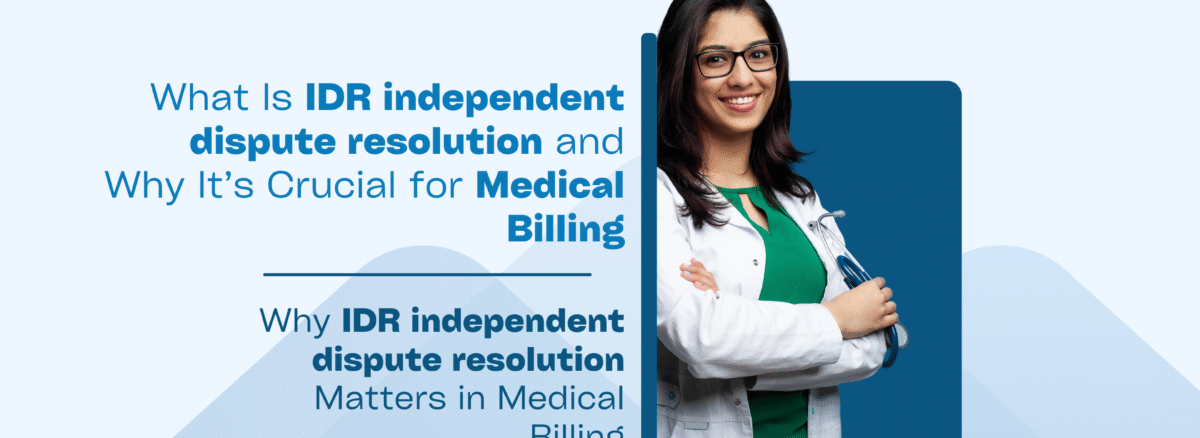When healthcare providers submit out-of-network claims, disputes with insurers over payment amounts often arise. Enter IDR, independent dispute resolution, a structured, third-party arbitration mechanism designed to resolve these disagreements fairly and efficiently. For medical billing professionals, understanding the IDR independent dispute resolution process is essential—especially when claims are denied or underpaid.
What does IDR, independent dispute resolution, mean?
The term IDR, independent dispute resolution, refers to a formal arbitration process initiated after open negotiations between providers and payers fail. It’s primarily invoked under the No Surprises Act, ensuring that neither patients nor providers bear the burden of protracted negotiation.
How IDR Independent Dispute Resolution Works
Open Negotiation Period
Before invoking the IDR independent dispute resolution, both provider and insurer must engage in a 30-business-day open negotiation period initiated after a denial or initial payment decision.
Initiation Window
If negotiations fail, either party may initiate the IDR independent dispute resolution within 4 business days following the end of the negotiation window.
Selection of a Certified Arbitrator
The disputing parties select a certified IDR entity. If they cannot agree within 3 business days, the federal regulator randomly assigns one.
Submission of Offers and Evidence
Both sides submit payment proposals along with supporting documentation. The arbitrator then reviews the submissions and selects one offer in a “baseball-style” resolution.
Decision Timeline
The IDR independent dispute resolution decision must be made within roughly 30 business days, and the losing party bears the IDR fees.
Why IDR Independent Dispute Resolution Matters in Medical Billing
Cash Flow Relief
Many providers—especially those delivering emergency or out-of-network care—face delayed reimbursements. IDR independent dispute resolution offers a structured pathway to secure fair payment without a drawn-out appeals process.
High Win Rates for Providers
Recent data shows providers prevail frequently. In 2023–2024, providers or their billing consultants initiated most disputes, and providers won decisions in well over half of the cases.
Efficient and Cost-Effective
The IDR independent dispute resolution process is far less expensive than litigation, with administrative fees often in the few-hundred-dollar range per party. Entities compete on fee structure, enhancing cost efficiency.
Transparent Framework
Clear timelines—from the open negotiation period to arbitrator selection and final decision—ensure predictability and accountability in the process.
Case Study: Rising Use of IDR Independent Dispute Resolution
Data from CMS indicates a dramatic increase in dispute volume over recent years. In 2023 and the first half of 2024, providers initiated over 1.26 million disputes, with certified IDR entities closing a growing number of cases. In May 2025 alone, over 200,000 new disputes were launched, while closed cases outpaced new filings—highlighting improved process capacity.
Best Practices for Providers Using IDR: Independent Dispute Resolution
- Document Thoroughly
Include all relevant evidence—EOBs, claim details, service codes—in your initiation packet to avoid eligibility challenges NMR. - Monitor Timelines Closely
Adhering to the 30-business-day negotiation period and 4-business-day initiation window is critical. - Benchmark Offers Strategically
Providers often succeed by leveraging historical in-network or out-of-network rates, while payers may frame their offers around the Qualified Payment Amount (QPA). - Track Fee Variations
Since IDR independent dispute resolution fees can vary among entities, consider both cost and reputation when selecting an IDR body.
In the complex landscape of medical billing, IDR independent dispute resolution stands as a powerful tool to recover rightful reimbursement, protect provider cash flow, and avoid burdensome litigation. With structured timelines, high provider win rates, and growing institutional support, it offers a reliable recourse for claim disputes.
For healthcare providers and billing professionals ready to navigate the IDR independent dispute resolution process more effectively, ZanexMed offers expert guidance tailored to your needs. Whether you’re facing an out-of-network claim denial or want to streamline your arbitration strategy, ZanexMed helps you claim what’s owed—so you’re not leaving money on the table.


